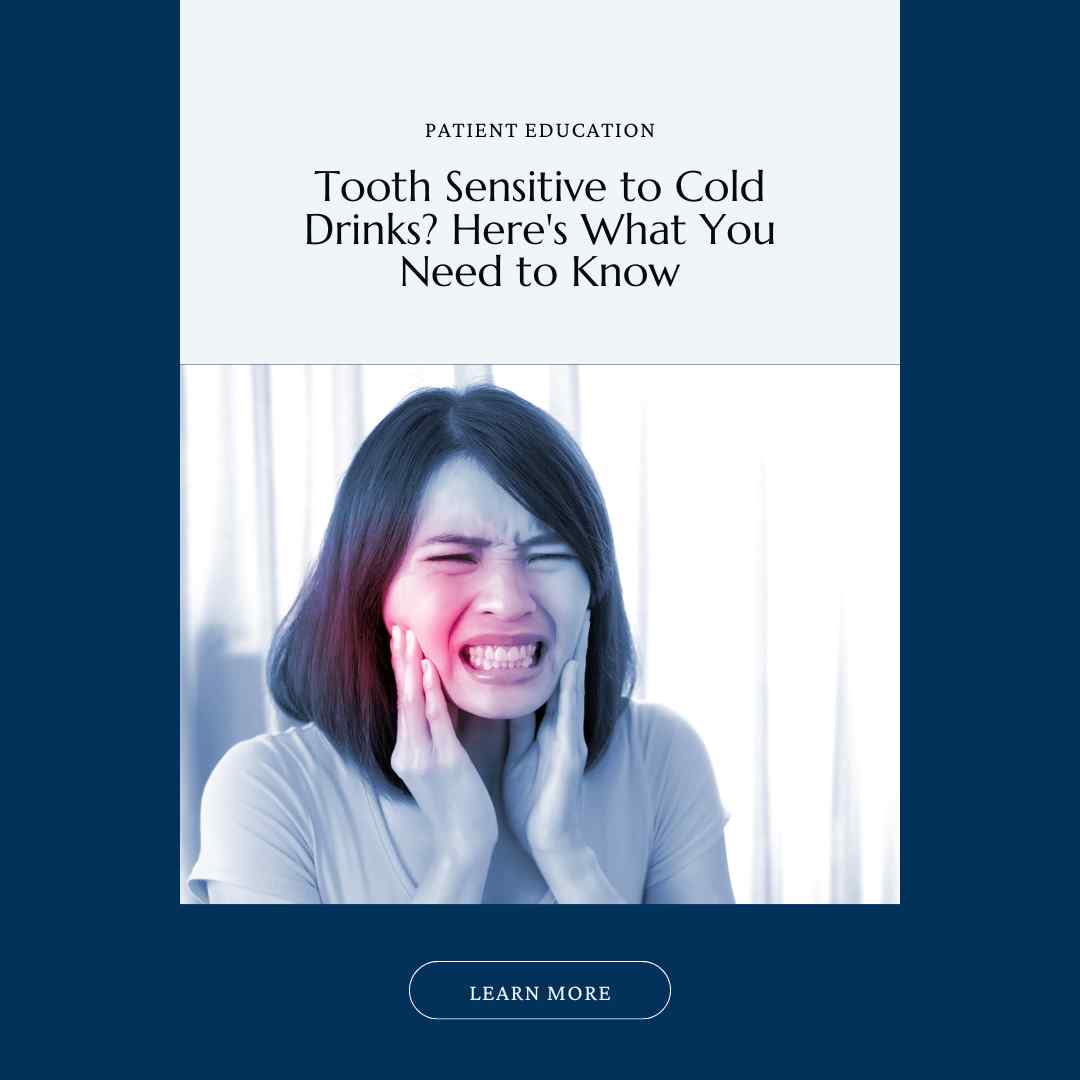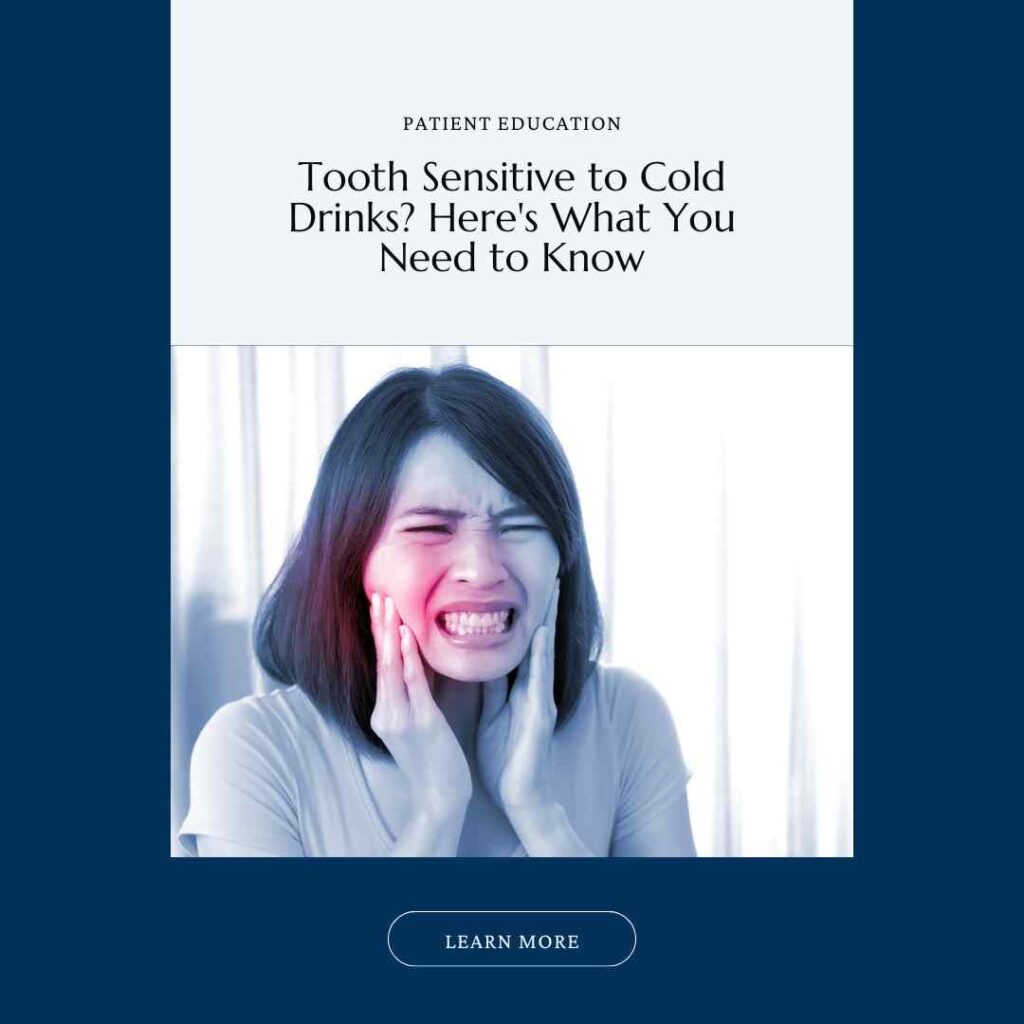Tooth Sensitive to Cold Drinks? Here’s What You Need to Know


Have you ever winced at the sharp twinge in your teeth when sipping a cold drink or enjoying an ice cream cone? You're not alone. Many people experience tooth sensitivity to cold, a common dental issue that can turn simple pleasures into uncomfortable experiences. This discomfort often leaves individuals wondering why their teeth hurt after eating ice cream or why they're suddenly sensitive to cold drinks.
Understanding tooth sensitivity to cold is crucial for maintaining oral health and enjoying life's little indulgences. This article will explore the causes behind sensitive teeth, how to tell the difference between sensitivity and other dental problems, and long-term solutions to tackle this issue. We'll also look at how age plays a role in tooth sensitivity and provide practical tips to help you manage and prevent this common concern. So, if you're tired of avoiding your favorite cold treats, read on to learn how to keep your smile happy and healthy.
Table of Contents
Differentiating Sensitivity from Other Dental Issues
Cavity vs. sensitivity
Tooth sensitivity and cavities can cause similar discomfort, but they have distinct characteristics. Sensitivity typically results from exposed dentin, causing short, sharp pain in response to specific triggers 1. Cavities, on the other hand, are small holes in the tooth surface caused by decay 1. While sensitivity pain is usually brief, cavity pain may be continuous or more intense as the decay progresses 2.
Gum disease symptoms
Gum sensitivity often gets mistaken for tooth sensitivity. However, gum sensitivity is characterized by pain in the gums rather than the teeth themselves 3. Common symptoms include swollen, tender gums that bleed easily, and persistent bad breath 3. Gum disease, primarily caused by plaque buildup, can lead to these symptoms if left untreated 3.
Signs of cracked teeth
Cracked teeth can sometimes mimic sensitivity. Signs of a cracked tooth include sharp pain when biting down, sensitivity to temperature changes, and swelling around the affected tooth 4. Unlike general sensitivity, pain from a cracked tooth may be localized to a specific area and can worsen over time 2.
When to see a dentist
It's crucial to consult a dentist if sensitivity becomes severe, persists, or is accompanied by other symptoms like swelling or visible damage to the tooth 5. Additionally, if sensitivity occurs spontaneously or is limited to one tooth, it may indicate a more serious issue requiring professional attention 2. Early diagnosis and treatment can prevent further complications and help maintain oral health.
Long-term Solutions for Cold Sensitivity
Changing your oral care routine
Using toothpaste designed for sensitive teeth can help alleviate discomfort 6. Brushing with a soft-bristled toothbrush and being gentle while cleaning can prevent further irritation 6. Incorporating fluoride rinses or gels into the routine can strengthen enamel and reduce sensitivity 6.
Dietary modifications
Limiting acidic foods and beverages, such as citrus fruits and wine, can help reduce tooth sensitivity 6. Consuming dairy products, crunchy vegetables, fish, tofu, and vitamin C-rich fruits can improve teeth health 6. It's advisable to reduce intake of sugary foods like ice cream and candy, as they contribute to enamel breakdown 7.
Stress management techniques
Stress can impact oral health by weakening the immune system and increasing susceptibility to infections 8. Adopting stress management techniques like meditation, deep breathing exercises, and yoga can help mitigate these effects 8. These practices can also reduce the likelihood of stress-related issues such as bruxism 8.
Regular dental check-ups
The American Dental Association recommends adults have at least one dental checkup annually 9. Regular preventive dental visits help catch and treat issues early, potentially avoiding more expensive treatments later 10. These appointments allow for professional cleanings, removing plaque and tartar buildup that contribute to sensitivity 9.
The Impact of Age on Tooth Sensitivity
How teeth change over time
As people age, their teeth undergo natural wear and tear. This process can lead to the erosion of tooth enamel, the hard outer layer that protects teeth 11. Over time, this erosion can expose the underlying dentin, which contains thousands of tiny tubules leading to the tooth's nerve center 12. This exposure often results in increased sensitivity to hot, cold, or sweet stimuli 12.
Age-related dental concerns
Tooth sensitivity tends to peak between the ages of 25 and 30 12. However, adults between 20 and 50 years old are most likely to experience sensitivity, with the highest incidence occurring between 30 and 40 13. This increased prevalence is often attributed to gum recession, which becomes more common with age 13. Additionally, older adults face a higher risk of root caries, with approximately 50% of individuals over 75 having at least one affected tooth 14.
Maintaining oral health as you age
To combat age-related dental issues, it's crucial to maintain good oral hygiene practices. Using a soft-bristled toothbrush and gentle brushing technique can help prevent further enamel erosion 13. For those experiencing dry mouth, a common issue affecting 30% of people over 65, staying hydrated and limiting sugary or caffeinated beverages is recommended 14. Regular dental check-ups and professional cleanings are essential for early detection and treatment of age-related dental problems 11.
Conclusion
Understanding and managing tooth sensitivity to cold is key to maintaining a healthy smile and enjoying your favorite treats without discomfort. By recognizing the signs of sensitivity and differentiating them from other dental issues, you can take steps to address the problem effectively. Regular dental check-ups, good oral hygiene practices, and lifestyle adjustments can go a long way in reducing sensitivity and preserving your oral health.
As we age, our teeth naturally change, which can lead to increased sensitivity. However, with proper care and attention, it's possible to keep your teeth strong and comfortable throughout your life. Remember, if you're dealing with severe or persistent sensitivity, it's crucial to consult a dentist for professional advice and treatment. If you're facing an emergency with cold sensitivity when we're closed, you can find some helpful tips in this blog post. By staying proactive about your oral health, you can continue to enjoy life's simple pleasures without the worry of tooth sensitivity.
FAQs
What does it mean if a tooth is sensitive to cold beverages?
When a tooth shows sensitivity to cold, it often indicates that the gums have receded, exposing the tooth roots which are covered by a thinner layer of enamel. This exposure can irritate the nerve within the tooth's inner pulp, making it sensitive to cold temperatures.
How can I alleviate my teeth's sensitivity to cold?
To manage teeth sensitivity, you can use desensitizing toothpaste and mouthwash that help block pain. Additionally, your dentist might apply fluoride to sensitive areas or use dental adhesives or sealants to protect the teeth. In some cases, a gum graft may be necessary.
Does sensitivity to cold beverages suggest I need a root canal?
Not necessarily. Tooth sensitivity alone, whether to cold or cold water, does not automatically imply the need for a root canal. Dentists usually consider other treatments before recommending a root canal.
Why has my tooth suddenly become sensitive to cold?
Sudden tooth sensitivity to cold often occurs when the enamel, the tooth's outer protective layer, wears down. This wear can expose the underlying dentin, a sensitive layer that transmits temperature changes to the nerves, causing discomfort.
References
[1] – https://www.sensodyne.com/en-us/oral-health-tips/recognizing-sensitive-teeth/cavity-vs-sensitivity/
[2] – https://www.windycityfamilydental.com/news-feed/does-tooth-sensitivity-mean-you-have-cavity/
[3] – https://espiredental.com/do-i-have-sensitive-gums-or-sensitive-teeth/
[4] – https://my.clevelandclinic.org/health/diseases/21628-fractured-tooth-cracked-tooth
[5] – https://www.dentalcarepasadena.com/blog/sensitive-teeth-3-signs-it-is-time-to-see-your-dentist/
[6] – https://www.quora.com/Are-there-specific-dietary-changes-that-can-help-reduce-tooth-sensitivity
[7] – https://www.myersdental.com/blog/by-changing-your-diet-you-can-reduce-tooth-sensitivity
[8] – https://www.cottonwooddentalutah.com/the-impact-of-stress-on-oral-health-tips-from-salt-lake-city-dentists/
[9] – https://www.gatewayfamilydentist.com/the-importance-of-regular-dental-checkups-a-gateway-to-a-healthy-smile
[10] – https://www.healthpartners.com/blog/dental-preventive-visit/
[11] – https://www.webmd.com/oral-health/teeth-gums-age
[12] – https://my.clevelandclinic.org/health/symptoms/10954-teeth-sensitivity
[13] – https://www.mapleshadecenter.com/blog/is-your-age-at-the-root-of-your-sensitive-teeth
[14] – https://www.ada.org/en/resources/ada-library/oral-health-topics/aging-and-dental-health
The information available on the Website is for general health information only and is not intended to be a substitute for professional medical advice, diagnosis or treatment. You should not rely exclusively on information provided on the Website for your health needs. All specific medical questions should be presented to your own health care provider and you should seek medical advice regarding and before making any changes related to your health.
If you choose to use the information available on the Website without prior consultation with and consent of your physician, you are agreeing to accept full responsibility for your decisions and agreeing to hold harmless Randall K. McVey, DMD PA, its agents, employees, contractors, and any affiliated companies from any liability with respect to injury or illness to you or your property arising out of or connected with your use of this information.
MedicAL DISCLAIMER
Patient Portal
help
Disclaimers
HIPAA
Accessibility
Privacy Policy & Cookie Policy
Terms & Conditions